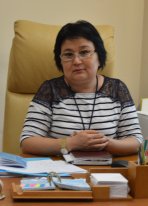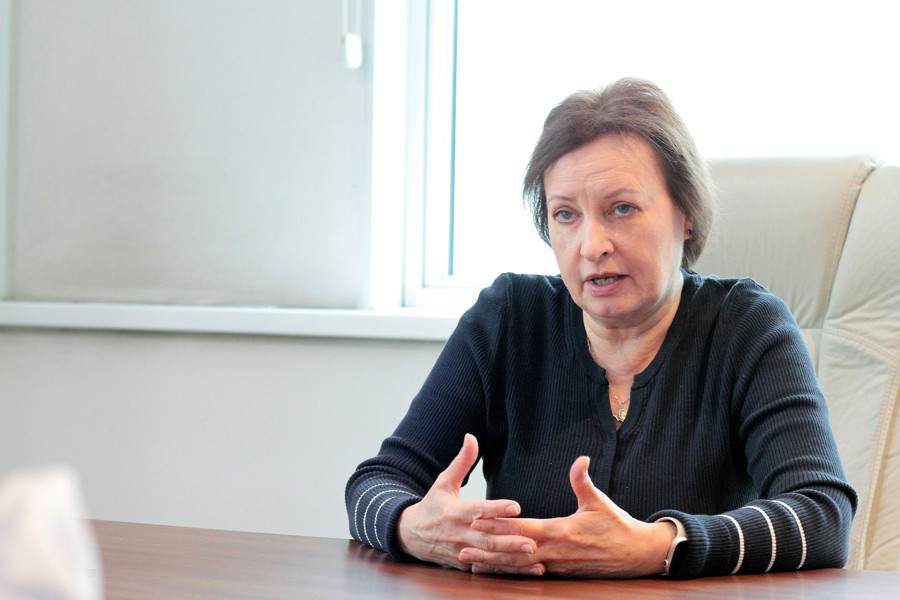Deputy Chairperson of the Committee for Protection of Children’s Rights of Kazakhstan’s Ministry of Education and Science Manshuk ABDYKARIM:
ALTERNATIVE FAMILY-BASED CARE FOR ORPHANED CHILDREN IS ACTIVELY IMPLEMENTED IN KAZAKHSTAN, NUMBER OF ORPHANAGES ARE DECREASING

More than 9,000 children are in full state care, while over 2,500 potential adoptive parents are on the waiting list, according to Kazakhstan’s ministry of education and science . Deputy Chairperson of the Committee for Protection of Children’s Rights of Kazakhstan’s Ministry of Education and Science Manshuk ABDYKARIM talked in an interview with Interfax-Kazakhstan what measures the state takes in order for every child to be taken into family care, when the national database on orphaned children would be set up and why the child adoption process is suspended for U.S. citizens.
- In the last five years the total number of orphaned children have significantly shrunk in the country. What measures does the ministry plan on further decrease in their numbers ? What objectives does the ministry have on this matter?
- At the legislative level a decision was taken to stimulate financially Kazakhstan-based families, guardians, foster parents. These measures got the matter off the ground and we had the number of orphaned children significantly reduced. If in 2008-2009 there were over 18,000 children in orphanages nowadays we have just about 9,000 kids.
The state has supported all the alternative ways of family-based care in Kazakhstan for orphaned children. Now we can relocate children from orphanages to Kazakhstan-based foster families offering some monies, guardians and foster parents get financial assistance. From 2015 we will offer financial incentives to adoptive parents.
We have a concrete task to set up the centralized database for all orphaned children to monitor the implementation of state support for such children.
After the reduction in orphanage-based children the process of unbundling will start in Kazakhstan, in other words, the reduction in orphanages. Orphanages have been closing down with one orphanage shut down in Astana and two more orphanages expected to follow its suit in Almaty region, and now I am relocating children.
We have the following filed of work: we are examining a reward mechanism for the set-up of family-based orphanages or according to the Europeans terms “corporate foster families”. We will conduct research and there may be Kazakh families in rural communities willing to offer each foster care for 5-10 children from orphanages. We will yet examine the issue of financing such a family as an orphanage. This is a budgetary program; it exists as a family type orphanage. The only matter is for us to define how to finance. The objectives and goals of our team are clear; currently we are drafting a legislative base. The main task given to us by the head of state is to improve the legislative base in the field of family-matrimonial relations.
- When will the centralized database on orphaned children be introduced in Kazakhstan and what will it feature?
- We are currently drafting a feasibility study on such a base, we held a contest. This database will cover district and regional education directorates, our committee for the protection of children’s rights, the justice ministry, the foreign ministry, embassies and consulates, the ministry of health and social development. It will be installed in these entities.
Let’s say a child was identified in a district, he/she is to be registered with his/her data to be fed into the database and tracked until their age of 18. If this is a child with disabilities then the base will have information on the foster family, what allowances are paid, if he/she is adopted then by what family, if by foreigners, then an embassy takes over guardianship of such children. My understanding is that the database would include 33,000 kids.
If a child were provided with housing then we would note down a “housing program is implemented”, if not, then we would pass on relevant information to local authorities. A central office, regional or district, would already trace the entire work process. The creation of this database would allow us to set a transparent system.
But the point is that we are in the process of discussing adoption confidentiality. Not all kids from orphanages want to be shown as orphaned children. Perhaps to some extent they are ashamed. We encountered this when were concluding memorandums with NGOs on the creation of a website to look for potential adoptive parents, and then not every orphaned child at orphanages wanted to have his/her photo taken for this project. Yes, they said so: we do not want people to know us. We will still talk over these matters but will include everyone.
We expect about 500 million tenge to be required, we plan this for three years. We intend to finalize the feasibility study by January 2015, and start implementing this program in the same year if we are provided with monies, an then in 2016 we would supervise it, and in 2017 we would already train staff.
And then we would include the confidentiality system. Adoption confidentiality is spelled out in the legislation. Adoptive families would choose themselves whether the adoption should be confidential or not.
- How long can the waiting process last?
- I cannot say this. Annually we identify around 8,000 children left without parental care. We try to arrange about 65-70% of them to live with foster families. At best, they may be sent to adaptation centers for a certain period, but we try and place them into foster care, arrange adoptions. We try and arrange for newborns to be adopted by Kazakhstan’s citizens straight away.
Our Kazakhstan’s citizens are very selective, they want healthy kids aged up to 3. They wish to adopt a child so that nobody is aware that this is not their biological child . I am not afraid to say that now adoptive parents come to choose children as a commodity. That’s not right. Directors of many orphanages here complain that adoptive parents come and start looking into children’s ears or mouths. Such things happen. I do not say that all of them are like these ones. There are adoptive parents, who come and adopt children with disabilities I should state to their credit. These are the people who really want to be parents. We bow before them.
We would possibly talk to those hopeful parents to encourage them to take kids aged 5-6 into foster care for 2-3 months under a contract in order to check how they get along. Perhaps over this time they would get used to a child they and want to adopt. Let’s have a go. In case of a failure they could bring back this child to an orphanage and would adopt a younger kid. Or well, they maybe would become attached to that child because children aged 5-6 are very interesting kids, their age is interesting. As a rule, these are the children who realize that by getting into home care they found a mum. And then perhaps, there would be no long waiting lists.
We have just around 10-15% of all hopeful parents willing to adopt 5-6-year-old kids and for this reason we have such waiting lists .
- How many children were adopted by foreign citizens until 2012?
- The adoption process has been ongoing since 1999 and foreign citizens have adopted 8,885 kids to date. Before 2011-2012 adoptions here were independent, we used to work directly with parents, foreign citizens, who used to draw up documents in their home countries through adoption agencies, and produced them to us to adopt children in Kazakhstan hiring lawyers. We have been tracking each child’s destiny with reports on them sent to us. Now we think over the implementation of unified report forms for parents, who adopted children on their own. We will contact them via agencies and track each child’s destiny.
- What are statistics on children adopted by foreign citizens? What countries are more active? How are children’s destinies abroad tracked?
- In 2012, Kazakhstan passed the Code on Marriage and Family. We looked forward to it because a clear-cut mechanism was set out in the code for working with foreign adoption agencies. Upon enactment of this code the accreditation of foreign agencies got underway in Kazakhstan. In 2012, 37 agencies were accredited here, now we have 32 of them left. Five agencies were closed down. Some of them were closed down due to law violations. They were not registered with the Justice Ministry, and not registered in regions where they had to work.
We have mainly accredited agencies from Germany, Spain, Belgium, France, the USA, Italy, Canada – here are the countries we work with. Spain, Belgium and Germany are the most active here. Since 2012, since passing the Code on Marriage and Family, in the last two years 80 kids have been adopted by foreign citizens. The Hague Convention states that the country, which adopts a child, must provide reports about him/her, and anyway, comply with all those requirements offered by the country of origin.
We legally outlined our requirements for countries adopting children. At first, this is reporting until kids reach the age of 18. We get a commitment from them that they will report to us on them once a year until children turn 18, and in the first three years upon adoption they must provide adoption reports every 6 months.
Now we will introduce the norm in the legislation that each accredited adoption agency should have its legal successor in the event of bankruptcy or closure. We are proposing this mechanism. We will specify clearly through legislative acts the mechanism for supervision of work with these agencies on international adoption issues .
- Give clarity on the situation concerning the suspension of adoptions of Kazakhstan-born children by U.S. citizens. When will U.S. citizens get back the opportunity to adopt kids from Kazakhstan? What work is being conducted to this end?
- The situation is that the country of origin is entitled to suspend the adoption procedure in case of a violation or a failure to meet agreed commitments. (...) As you know, we had no reports on over 600 children adopted by [U.S.] citizens. There was information in media that we do not know allegedly where these children are. We, on the Committee for the Protection of Children’s Rights, are working with the U.S. Embassy , the Kazakh Foreign Ministry. We set up working groups, which repeatedly visited the USA and other countries. The Committee for the Protection of Children’s Rights provided the list of all these 600 kids, on whom there were no reports. We sent the list to the Kazakh Foreign Ministry, which resent it to the U.S. State department. Reports on 370 children adopted by the U.S. citizens were sent into us; the kids are safe and sound , being brought up in families. The U.S. State department has been working on the issue on other children.
The U.S. State department explained the situation to me as follows: many parents moved over to other states and adoption agencies have difficulties tracing them. Now they are doing this job. During our trip to the USA and training sessions I raised this issue in each state. It happened so that each separate state, where this agency worked, is responsible for its activity. We distributed the list through the embassy and will carry on with this work. I was not, of course, authorized to tell these things; however nevertheless, I made it clear anyway that it is unlikely that we will [resume] this procedure as long as we do not get the last report. We need to find these kids.
- Thank you for your time.
October, 2014
© 2026 Interfax-Kazakhstan news agency
Copying and use of these materials without reference to the source is prohibited
Archive





